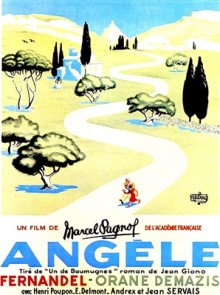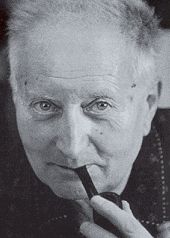
Jean Giono was a French writer who wrote works of fiction mostly set in the Provence region of France.

Cléo from 5 to 7 is a 1962 French New Wave drama film written and directed by Agnès Varda.
Louis Pauwels was a French journalist and writer.
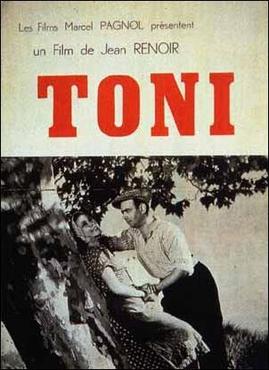
Toni is a 1935 French drama film directed by Jean Renoir and starring Charles Blavette, Celia Montalván and Édouard Delmont. The credits mention no writers other than the story writer Jacques Levert, but the script was later confirmed to be authored by Renoir and Carl Einstein. It is an early example of the casting of non-professional actors and on-location shooting - both of which would influence the Left Bank of the French New Wave movement. Examining the romantic interactions between a group of immigrants working around a quarry and a farm in Provence, it is also generally considered a major precursor to the Italian neorealist movement, for its concerns on the working class, use of non-professional actors and on-location shooting.
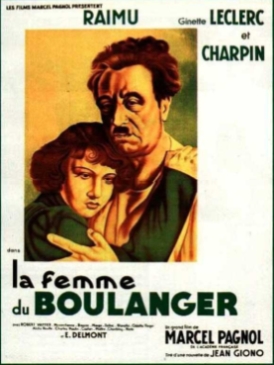
The Baker's Wife is a 1938 French comedic drama film directed by Marcel Pagnol and featuring an ensemble cast lead by Raimu, Ginette Leclerc, and Fernand Charpin. It was adapted by Pagnol from a episode of French author Jean Giono's 1932 novel Blue Boy. In the film, the new baker in a Provençal village loses the will to bake after his wife runs off with a handsome shepherd, so, to regain their daily bread, the feuding villagers agree to put aside their bickering and work together to bring back the baker's wife.

Marius is a 1931 French romantic drama film directed by Alexander Korda and starring Raimu, Pierre Fresnay, Orane Demazis, Fernand Charpin, and Alida Rouffe. Based on the 1929 play of the same name by Marcel Pagnol, it is the first part of the Marseille Trilogy, which also includes the films Fanny (1932) and César (1936). The film was made for the French subsidiary of Paramount Pictures. A separate Swedish-language version, titled Longing for the Sea and directed by John W. Brunius, was also released in 1931, and a German-language version, titled The Golden Anchor and also directed by Korda, was released the following year.
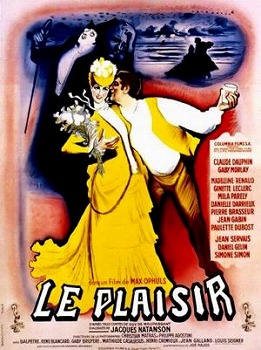
Le Plaisir is a 1952 French comedy-drama anthology film by German-born film director Max Ophüls (1902–1957) adapting three short stories by Guy de Maupassant — "Le Masque" (1889), "La Maison Tellier" (1881), and "Le Modèle" (1883).

Saturnin Fabre was a French film actor.

Fanny is a 1932 French romantic drama film directed by Marc Allégret and starring Raimu, Pierre Fresnay, Orane Demazis, Fernand Charpin, and Alida Rouffe. Based on the 1931 play of the same name by Marcel Pagnol, it is the second part of the Marseille Trilogy, which began with Marius (1931) and concluded with César (1936). The film was shot both at the Billancourt Studios in Paris and on location in Marseille, with sets designed by the art director Gabriel Scognamillo. Like Marius, Fanny was a box office success in France and is still considered a classic of French cinema.

César is a 1936 French romantic drama film written and directed by Marcel Pagnol and starring Raimu, Pierre Fresnay, Fernand Charpin, Orane Demazis, and André Fouché. It is the final film in Pagnol's Marseille Trilogy, which began with Marius (1931) and continued with Fanny (1932). Unlike the other two films in the trilogy, César was not based on a play by Pagnol, but was written directly as a film script. In 1946, Pagnol adapted the script for the film as a stage play.
Édouard Delmont was a French actor born Édouard Marius Autran in Marseille. He died in Cannes at age 72.

Orane Demazis was a French actress.

The Strangers in the House is a 1942 French crime film by Henri Decoin after the novel by the same name by Georges Simenon in 1940.

The Island of Love is a 1944 French drama film directed by Maurice Cam and starring Tino Rossi, Édouard Delmont and Josseline Gaël.

Heartbeat is a 1938 French comedy film directed by Marcel Pagnol and starring Fernandel, Orane Demazis and Fernand Charpin. It was remade in 1999 as Le schpountz, directed by Gérard Oury.
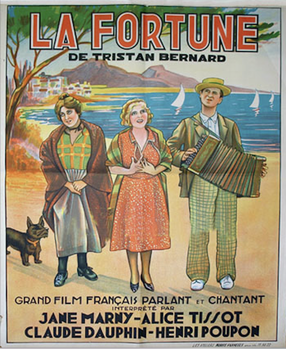
The Fortune is a 1931 French comedy film directed by Jean Hémard and starring Alice Tissot and Simone Deguyse and Claude Dauphin. It was based on the story of the same title by Tristan Bernard.

The Strange Monsieur Victor is a 1938 French-German drama film directed by Jean Grémillon and starring Raimu, Pierre Blanchar and Madeleine Renaud. It was shot at the Tempelhof Studios in Berlin. The film's sets were designed by the art directors Otto Hunte and Willy Schiller. The film was made by the German major studio Universum Film AG in collaboration with its French subsidiary. It was the thirteenth most popular film at the French box office in 1938.

The Pan trilogy consists of three novels by the French writer Jean Giono, published in 1929–1930. The stand-alone stories are set in Provence and revolve the struggles of the peasant population. Two of the novels were made into films in the 1930s by Marcel Pagnol.
Jacques Thévenet was a French painter and illustrator.

Until the Last One is a 1957 French-Italian thriller film directed by Pierre Billon and starring Raymond Pellegrin, Jeanne Moreau and Paul Meurisse. It was shot at the Photosonor Studios in Paris and on location around the River Somme. The film's sets were designed by the art director Jean d'Eaubonne. A film noir, it attracted around a million and a quarter spectators at the French box office.
